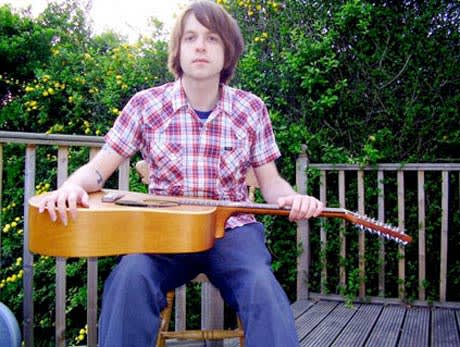Even though it was a frigid Sunday night, Casa Del Popolo was swarming with
people. "This doesn't happen where I'm from," Gary Higgins mumbled to the mass of audience before him.
The Connecticut songwriter plays lonesome and forlorn songs that are parenthetically funny at times but always sincere. They are highlighted best on his 1973 album Red Hash, which was reissued on Drag City a few years back to unanimous critical acclaim. On that record, Higgins's vocals sound young, tremulous and reminiscent of early '70s era David Crosby. Now 30 years later, his tenor is hushed and calm. Time has given his voice the opportunity to meld with the music and his often harrowing lyrics.
Higgins's performance, or lack thereof, was spare, as if he's wary of the attention he's garnered in recent years. In spite of this, he shone on the crowd favourite "Thicker Than a Smokey" and perfectly executed his rhythmic "I Can't Sleep at Night." As it got later, his songs became softer, the crowd frozen and hardly breathing while he played his whimsical "Windy Child." But Higgins can afford to be humble and reserved. The integrity of his songs speak for themselves.
The night's follow-up act, James Blackshaw, is being lauded as a guitar prodigy in the vein of Steve Reich. He fingerpicks the 12-string with the modest touch of a folk guitarist but clearly has the virtuosity of a classical player. The breadth and depth of his music is evidenced in his austere and modal compositions, many of which span at least ten minutes.
With his opener "Cross," the baby-faced guitar wizard immediately enchanted the audience. Some audience members who couldn't see the stage asked, mystified, "He's looping this, right?" as they tried to reason how one man could produce such lush and intricate sounds all by his lonesome. The answer, of course, was no. Blackshaw will mutilate your ideas of what one man is capable of. Yet in spite of this, the crowd got thinner and thinner. But this shouldn't be considered a slight. Chances are many likely wanted to listen to his music at home, in the comfort of their own inadequacy.
people. "This doesn't happen where I'm from," Gary Higgins mumbled to the mass of audience before him.
The Connecticut songwriter plays lonesome and forlorn songs that are parenthetically funny at times but always sincere. They are highlighted best on his 1973 album Red Hash, which was reissued on Drag City a few years back to unanimous critical acclaim. On that record, Higgins's vocals sound young, tremulous and reminiscent of early '70s era David Crosby. Now 30 years later, his tenor is hushed and calm. Time has given his voice the opportunity to meld with the music and his often harrowing lyrics.
Higgins's performance, or lack thereof, was spare, as if he's wary of the attention he's garnered in recent years. In spite of this, he shone on the crowd favourite "Thicker Than a Smokey" and perfectly executed his rhythmic "I Can't Sleep at Night." As it got later, his songs became softer, the crowd frozen and hardly breathing while he played his whimsical "Windy Child." But Higgins can afford to be humble and reserved. The integrity of his songs speak for themselves.
The night's follow-up act, James Blackshaw, is being lauded as a guitar prodigy in the vein of Steve Reich. He fingerpicks the 12-string with the modest touch of a folk guitarist but clearly has the virtuosity of a classical player. The breadth and depth of his music is evidenced in his austere and modal compositions, many of which span at least ten minutes.
With his opener "Cross," the baby-faced guitar wizard immediately enchanted the audience. Some audience members who couldn't see the stage asked, mystified, "He's looping this, right?" as they tried to reason how one man could produce such lush and intricate sounds all by his lonesome. The answer, of course, was no. Blackshaw will mutilate your ideas of what one man is capable of. Yet in spite of this, the crowd got thinner and thinner. But this shouldn't be considered a slight. Chances are many likely wanted to listen to his music at home, in the comfort of their own inadequacy.
